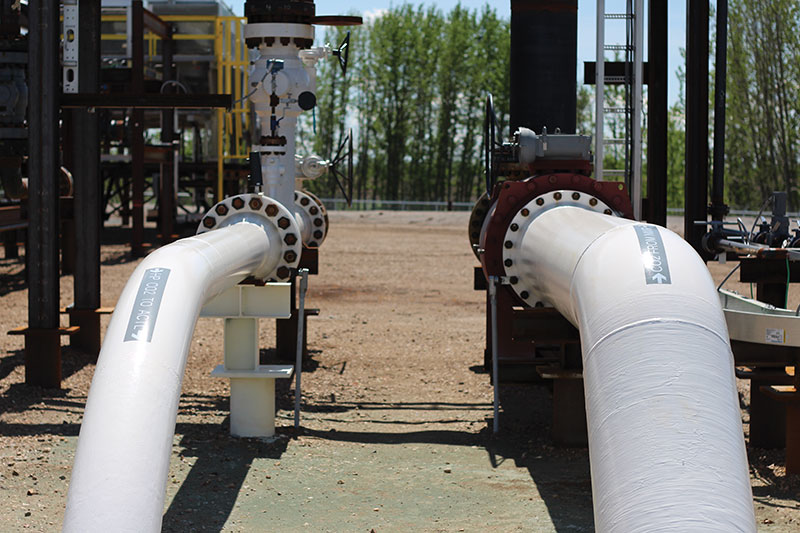Permian CO2 Storage Could Prove Problematic Due to Well Blowouts, Earthquakes
(Reuters) – Texas has seen surging interest from companies hoping to bury carbon dioxide in its oilfields, putting the state at the vanguard of a government-subsidized program to fight climate change.

But pumping CO2 into the ground could exacerbate earthquakes and well blowouts already happening in the Permian Basin as Texas struggles to manage wastewater disposal, potentially undermining public support.
"Without legitimate oversight of underground injection in Texas, we expect more geyser-like well blowouts, sinkholes, leaks from plugged and unplugged wells, and injection-induced earthquakes," said Virginia Palacios, executive director of Commission Shift, a Texas watchdog group pushing for tougher oversight of the oil and gas industry.
Such consequences have rarely happened as a result of CO2 injection over the decades the technology has been deployed. The unprecedented vast volume of carbon now proposed for burial, however, worries activists and researchers.
Carbon sequestration is vital to U.S. government goals to reduce emissions that cause global warming. The Biden administration's 2022 Inflation Reduction Act, landmark climate-change legislation, includes billions of dollars worth of subsidies for CCS projects.
While President-elect Donald Trump has vowed to gut the IRA, energy experts say CCS subsidies will likely survive due to bipartisan support.
Trump's transition team did not provide comment.
Several companies, including Occidental Petroleum OXY.N, plan to take advantage of IRA subsidies. The projects are concentrated in Texas, where CCS proponents argue underground geology is ideal for storing liquid and gaseous waste.
Permit Applications Jump
Over the last 12 months, the number of applications filed with the Environmental Protection Agency for carbon injection permits in Texas has jumped by 63% to 43, according to the agency, making it a national leader.
But Texas is dogged by problems linked to disposal of drilling wastewater underground. The Texas Railroad Commission (RRC) regulator has grappled with leaks and blowouts from orphan wells, as well as earthquakes, triggered by higher pressure underground from water injection.
Reuters spoke with a dozen Texas landowners and researchers who said proposed CO2 projects need more oversight than the state can offer to avert environmental and safety risks.
The RRC is seeking authority from the EPA to oversee its own permitting program for carbon sequestration to speed up approvals. The EPA, which is also reviewing Texas' handling of wastewater permitting following the blowouts, said the request was being considered.
The RRC said in a statement it is capable of effectively regulating CO2 injection wells, adding it has hired more staff.
Trump's victory increases the chances Texas will get this authority, experts say. North Dakota was the first state to receive oversight authority during Trump's first term and its governor, Doug Burgum, is Trump's pick for interior secretary, which includes responsibility for drilling permits on federal land.
(Reporting by Valerie Volcovici and Leah Douglas; Editing by Rod Nickel)
Related News
Related News

- Kinder Morgan Proposes 290-Mile Gas Pipeline Expansion Spanning Three States
- Enbridge Plans 86-Mile Pipeline Expansion, Bringing 850 Workers to Northern B.C.
- Intensity, Rainbow Energy to Build 344-Mile Gas Pipeline Across North Dakota
- Tallgrass to Build New Permian-to-Rockies Pipeline, Targets 2028 Startup with 2.4 Bcf Capacity
- U.S. Moves to Block Enterprise Products’ Exports to China Over Security Risk
- U.S. Pipeline Expansion to Add 99 Bcf/d, Mostly for LNG Export, Report Finds
- A Systematic Approach To Ensuring Pipeline Integrity
- 275-Mile Texas-to-Oklahoma Gas Pipeline Enters Open Season
- US Poised to Become Net Exporter of Crude Oil in 2023
- EIG’s MidOcean Energy Acquires 20% Stake in Peru LNG, Including 254-Mile Pipeline




Comments